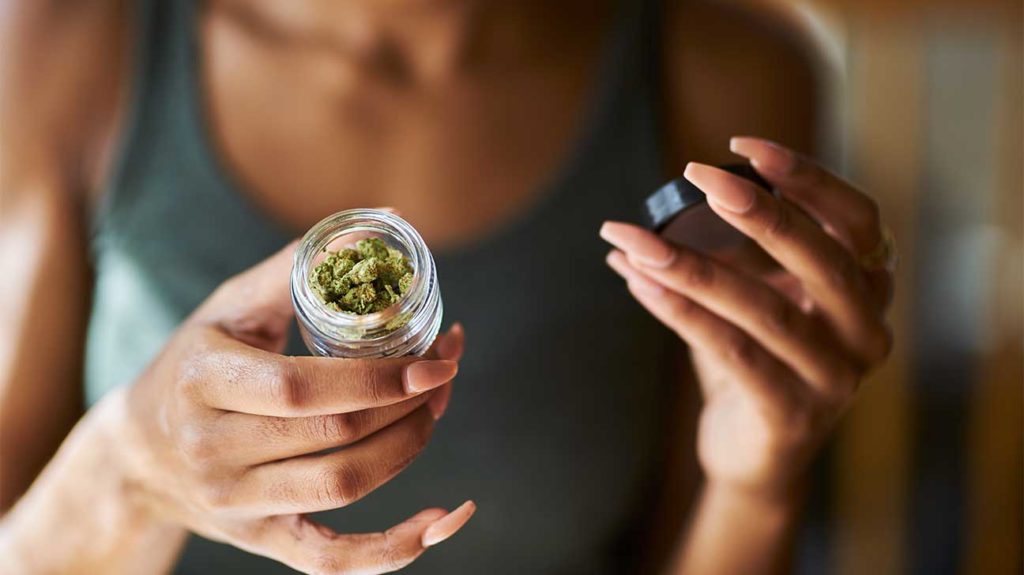
When used for symptoms of postnatal depression, marijuana may cause impaired judgment while parenting, worsened depression, and problems with breastfeeding.
It’s estimated that up to one in seven women experience postnatal (postpartum) depression (PDD). Researchers theorize this number may be significantly higher, as it’s suspected that many women do not report their symptoms. Certain research demonstrates that low-income or teen mothers experience this condition at rates up to two times higher than other mothers, groups which may also be more susceptible to drug abuse.
Managing postnatal depression is a serious concern for mothers facing this condition, as it can affect not just the mother, but the child as well. Postnatal depression can impair a woman’s ability to take care of herself and her child. It may even cause a woman to stop breastfeeding sooner than she would have if she hadn’t had depression or if her depression had been adequately treated.
As marijuana becomes more socially acceptable and legalized for medicinal and recreational purposes in a number of states, a rising number of individuals are turning to it to treat physical and mental health concerns. For new mothers, this includes postnatal depression. It’s worth noting that some fathers also experience postnatal depression, which may lead them to use marijuana in this way.
While some mothers seek an alternative route to avoid the side effects of traditional pharmaceuticals, others prefer to avoid these traditional treatments altogether. Many view marijuana as an all-natural, safe, and harmless remedy, however, many medical doctors and scientists disagree. Research is ongoing on this subject, but evidence is mounting which supports that marijuana is not a harmless drug to be used lightly.
Understanding Postnatal Depression
Many mothers experience postnatal “baby blues,” or bouts of anxiety, crying spells, mood swings, and sleep difficulties shortly after giving birth. These typically begin within the first few days after birth and continue for several days and up to two weeks after birth.
It’s when these symptoms continue or worsen that there is cause for concern. This severe, long-lasting form of depression is called postnatal or postpartum depression.
Symptoms of postnatal depression may become debilitating, making it difficult for a mother to handle daily tasks and to take care of her child. The onset of postnatal depression is typically within a few weeks of birth. Some women may develop symptoms up to six months after delivery.
Symptoms of postnatal depression range from mild to severe and may include:
- anger
- anxiety and panic attacks
- becoming easily irritated
- changes in appetite (eating too little or too much)
- depressed mood
- excessive crying
- extreme fatigue and low energy
- fear of being a bad mother
- feelings of worthlessness
- inability to think clearly or make decisions
- intense sadness
- losing interest and pleasure in favorite activities
- poor concentration
- severe mood swings
- sleep troubles (either insomnia or sleeping too much)
- withdrawing from loved ones
Many mothers may struggle with a sense of guilt, inadequacy, or shame. Postnatal depression may also make it difficult for a mother to bond with her baby.
In the most extreme cases, certain symptoms may jeopardize the safety of both the mother and child. The depression may become so intense that some individuals contemplate harming themselves or their baby. A mother may also have recurrent thoughts of death or suicide.
Postnatal depression is a serious medical condition that requires prompt medical treatment and support.
Marijuana And Postnatal Depression
Most of the support for marijuana as a treatment for postnatal depression is anecdotal at best. Taking a drug for a purpose not backed by scientific evidence could expose a person to risks that outweigh any supposed benefits.
The brain contains cannabinoid receptors, sites that are targeted by chemical compounds in marijuana. Researchers believe that the endocannabinoid system has a role in depression and regulating mood. When the endocannabinoid system malfunctions, it’s theorized that symptoms of depression, anxiety, and even pain could worsen.
The theory stands that by activating cannabinoid receptors by using marijuana, symptoms of depression could be alleviated or reduced. Even though some studies have claimed that marijuana may improve the symptoms of depression, a significant number have highlighted the opposite effect.
A 2018 study established that postpartum marijuana use is actually associated with depressive symptoms. Several studies have collected evidence finding that marijuana could worsen or cause depression and depressive symptoms. One study found that while low doses of synthetic THC alleviated depression, higher doses actually caused depression to worsen.
Marijuana use has been linked to amotivational syndrome, an effect which is said to cause apathy, detachment, dullness, impaired judgment, and lethargy, all potential symptoms of depression. Should an individual develop this syndrome by using this drug, it may worsen existing symptoms of depression.
Marijuana can worsen or trigger psychotic symptoms, which could be potentially problematic for a woman experiencing postpartum psychosis. Postpartum psychosis is a rare but serious condition marked by mania, hallucinations, severe confusion, paranoia, and delusions.
In addition to the inconclusive research on marijuana as a treatment for postnatal depression, using this drug as a mother could expose the mother and child to other risks.
Risks Of Using Marijuana While Breastfeeding
Breastfeeding mothers face particular concerns when contemplating marijuana use as a therapy for postnatal depression. The American College of Obstetricians and Gynecologists discourages the use of marijuana while breastfeeding and also recommends that ob-gyns not prescribe medical marijuana to breastfeeding women.
When a mother smokes pot or otherwise consumes marijuana, THC and other chemical compounds can make their way into the breastmilk. Breastmilk contains high amounts of fat, and since THC is fat soluble, this means breastmilk can carry concentrations of THC. THC is responsible for creating the mind-altering effects of marijuana.
Unlike when a nursing mother consumes alcohol, “pumping and dumping” after smoking is not an effective means of eliminating THC from the body. THC is stored in fat, allowing it to be slowly released over time, increasing the amount of time a breastfeeding child will be exposed to this chemical.
The Journal of Toxicology cautions that:
In one feeding, the infant would ingest 0.8% of the weight-adjusted maternal intake of one joint.
Other findings propose that this amount could be higher, equaling a tenth of what the mother consumes.
The Journal also details that, “THC can accumulate in human breast milk to high concentrations, and infants exposed to marijuana through their mother’s milk will excrete THC in their urine during 2 to 3 weeks.”
Research has shown that using marijuana while breastfeeding could decrease a child’s motor development. Certain researchers theorize that the quality and quantity of breastmilk may be affected, while other research suggests that using marijuana while breastfeeding could shorten the duration of breastfeeding.
In addition to these concerns, using marijuana while breastfeeding is thought to cause the following effects on a nursing child and/or as they grow:
- adverse effects on behavior
- growth delay in the infant
- poor sucking
- reduced muscular tone
- sedation
Animal studies indicate that THC could adversely affect the growth and development of a child’s brain, including by disrupting brain cell metabolism and important components of cellular DNA.
The California Society of Addiction Medicine also warns that, “early exposure to marijuana is associated with behavioral problems at age 10, and an increased risk of marijuana use at age 14.”
Risks And Dangers Of Using Marijuana As A Parent
Marijuana use while parenting can significantly impair thought and judgment, making it difficult to look after a child’s well-being and safety. Children thrive on structure, and individuals using marijuana may become forgetful and miss daily activities which are important to a child’s health, safety, and development.
Certain types of marijuana can make a person very sleepy, which can be hazardous while caring for a child. Marijuana can cause impairment while driving, making it dangerous to transport a child.
Recent research has found that children absorb chemicals from secondhand marijuana smoke. These findings led Dr. David Beuther to advise that “the adverse health effects are probably as bad as secondhand cigarette smoke.”
Alternative Treatments For Postnatal Depression
Women struggling with postnatal depression should seek professional help and not attempt to treat symptoms on their own. Doing so may not sufficiently treat this condition, resulting in endangerment to both the mother and child.
A variety of effective treatments exist for postnatal depression, including:
- counseling
- psychotherapy
- group treatment sessions
- support groups
- medications (i.e. antidepressants)
Support from family and friends is especially important during this time.
Should a mother desire to try medical marijuana for postnatal anxiety or depression, she should speak to a doctor first. However, according to the University of Washington, as of June 2017, depression was not specifically listed as a qualifying disorder for a medical marijuana card.
Despite popular beliefs, marijuana use can become addictive. Mothers with a cannabis use disorder should seek professional help for this condition.
Find Help And Support Today
The most comprehensive drug rehab programs offer treatments and services which address a mother’s unique needs. A mother may receive parenting assistance, emotional support, and family therapy, among other treatments. A select number of inpatient drug rehabilitation programs offer treatment services to nursing mothers.
Article Sources- The American College of Obstetricians and Gynecologists — ACOG COMMITTEE Opinion
https://web.archive.org/web/20190403150903/https://www.acog.org/Clinical-Guidance-and-Publications/Committee-Opinions/Committee-on-Obstetric-Practice/Marijuana-Use-During-Pregnancy-and-Lactation - American Psychological Association — What is postpartum depression & anxiety?
https://web.archive.org/web/20190403150903/http://www.apa.org/pi/women/resources/reports/postpartum-depression.aspx - California Society of Addiction Medicine — The Adverse Effects of Marijuana (for healthcare professionals)
https://web.archive.org/web/20190403150903/https://www.csam-asam.org/adverse-effects-marijuana-healthcare-professionals - NPR — Doctors Say Parents Shouldn’t Smoke Pot Around Kids
https://web.archive.org/web/20190403150903/https://www.npr.org/sections/health-shots/2016/12/19/505726846/doctors-say-parenting-and-pot-smoking-dont-mix - ScienceDaily — Cannabis: Potent Anti-depressant In Low Doses, Worsens Depression At High Doses
https://web.archive.org/web/20190403150903/https://www.sciencedaily.com/releases/2007/10/071023183937.htm - ScienceDirect — Marijuana use during and after pregnancy and association of prenatal use on birth outcomes: A population-based study
https://web.archive.org/web/20190403150903/https://www.sciencedirect.com/science/article/pii/S0376871618301649 - US National Library of Medicine — Cannabis and Breastfeeding
https://web.archive.org/web/20190403150903/https://www.ncbi.nlm.nih.gov/pmc/articles/PMC2809366/ - University of Washington — Effects of Marijuana on Mental Health: Depression
https://web.archive.org/web/20190403150903/http://adai.uw.edu/pubs/pdf/2017mjdepression.pdf




